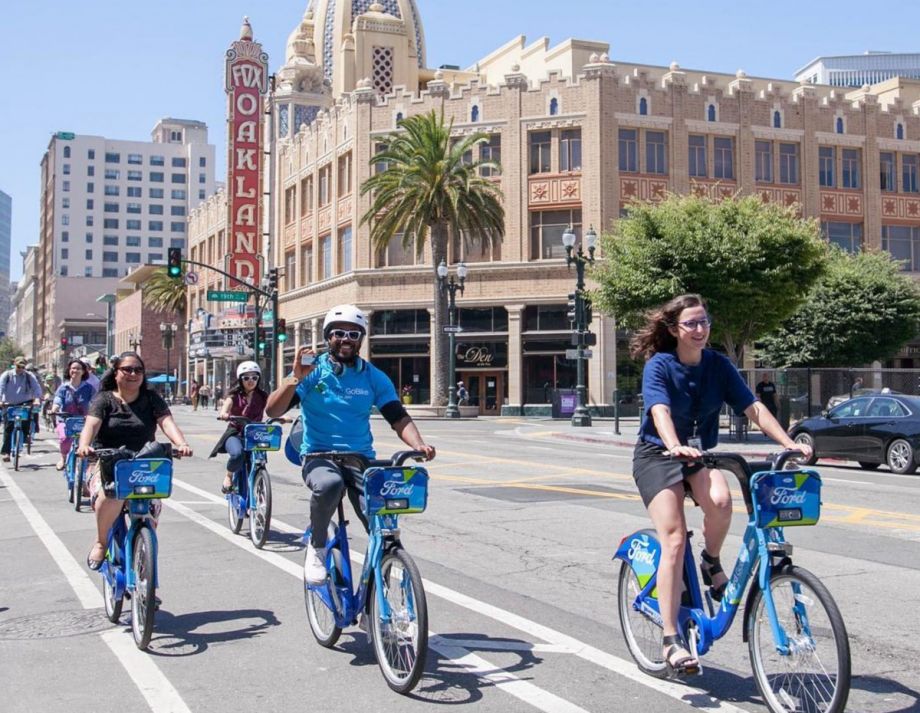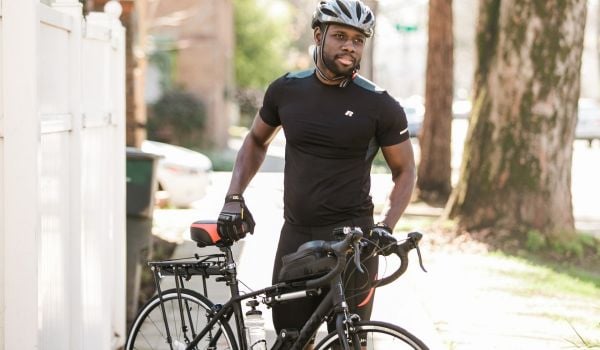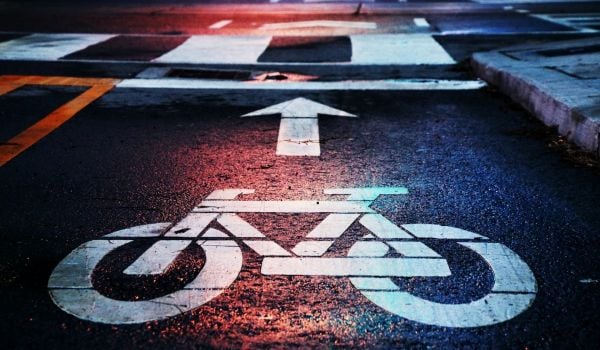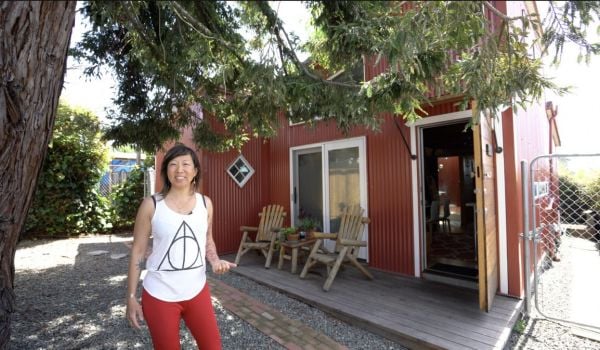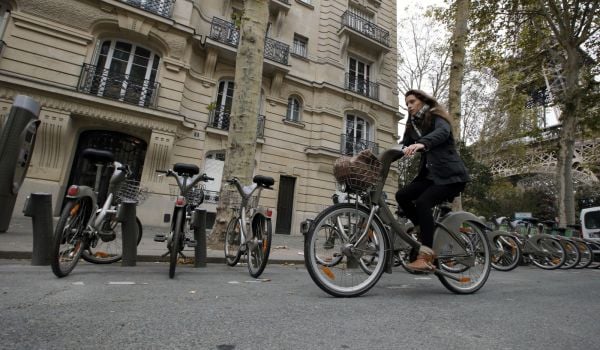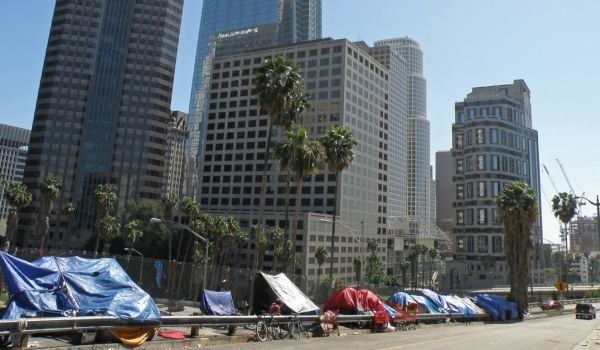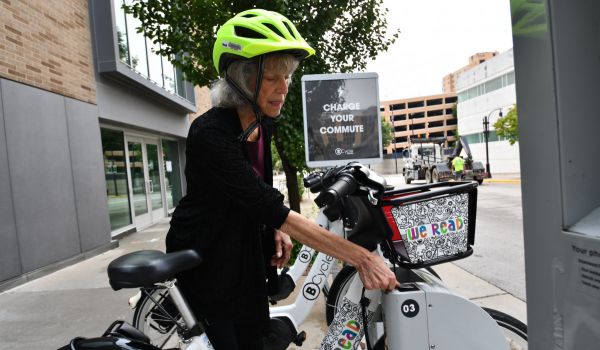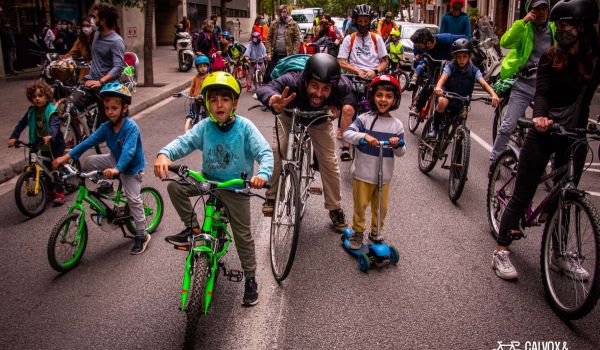On June 28, San Francisco’s Bay Area Bike Share became Ford GoBike. With the relaunch comes plans for a massive expansion that will eventually total 7,000 bikes in cities throughout the region. Last week, the East Bay got its first phase with 450 bikes at 43 stations in Oakland, Emeryville and Berkeley.
GoBike is a public-private partnership between Motivate — the bike-share company behind Citi Bike, Hubway, Capital Bikeshare, Divvy and many others — and the Metropolitan Transportation Commission (MTC), the Bay Area’s regional transportation planning agency. Ford is the title sponsor.
There are now at least 119 bike-share systems in the U.S. Though the basic operating principles have remained the same as the concept has spread from city to city over the past decade, new systems have learned from the mistakes of their predecessors. Whether it’s pricing, station layout, or the amount of time users get to ride for their money, newer systems seem to get more things right from the get-go.
GoBike has certainly learned lessons about making bike-share available to a broader range of users than the white men with white-collar jobs who typically ride. (According to a 2015 UC Berkeley report on Bay Area Bike Share members, 70 percent were white, 75 percent male, and 80 percent had an annual salary of $75,000 or more.)
GoBike launched with several equity initiatives including a $5, first-year annual membership for low-income residents (after the first year, low-income memberships are $5 per month); cash payment options for residents without credit cards; and a commitment to placing 35 percent of the stations in “communities of concern.” MTC defines communities of concern as census tracts that meet a certain threshold of minority and low-income residents, limited English proficiency, zero-vehicle households, cost-burdened renters and other factors.
That GoBike is considering equity from the start is at least in part the result of more than a year and a half of work by a coalition of Bay Area complete streets advocates and community groups that pushed Motivate, MTC and the region’s city governments. The coalition engaged with low-income communities and communities of color to ask them about barriers to bike-share use and where they wanted to see stations go. Even with those equity measures in place, some communities in Oakland feel like they’re once again being skipped over as wealthier parts of the city get new resources.
In early 2016, Bike East Bay and TransForm got funding from MTC to do community engagement around bike-share and car-share.
“We know that without outreach, the demographics of bike-share ends up being white, affluent, male professionals,” says Clarrissa Cabansagan, TransForm’s senior community planner. “In this era of immense gentrification and displacement, where families are struggling to survive in the Bay Area, we really ought to think about equity. … We want [the ridership] to look like the diverse communities that live in the Bay Area, that live in Oakland.”
TransForm synthesized its outreach in a new report called OakMob 101 (short for Oakland Mobility). Of survey respondents, 33 percent did not have access to a bike at home (8 percent were unable to ride), and 34 percent did not have access to a car. High costs were first among the reasons for not wanting to try bike-share or car-share. (The outreach was about both modes and lumps those findings together.) Credit card requirements, cell phone access and language were also cited as key barriers.
According to the report, 77 percent said they wanted to try bike-share after being engaged at an OakMob event. But many expressed concern that there were no plans for bike-share stations in their neighborhood, or that their neighborhood would be last to receive bike-share during GoBike’s three-phase expansion.
Still, Cabansagan gives Motivate credit for its equity initiatives, especially compared to many of the other car-sharing and transportation network companies in the Bay Area.
“To see Motivate, a private company, respond to community concerns is night and day compared to other companies,” she says. It’s worth noting that MTC plays a planning role in GoBike, but there is no public funding for its capital and operating expenses.
By the end of the summer, Motivate wants to increase its East Bay operations to 1,500 bikes at 120 stations. As part of that continued expansion, it’s funding outreach by Cycles of Change and Scraper Bike Team, both grassroots East Oakland bike organizations. The continued expansion will bring some bike-share stations into East Oakland, but it doesn’t include much of the area’s poorest neighborhoods.
“I think bike-share in Oakland is an amazing way to get people on the bikes and active. It’s really unfortunate that it’s not in East Oakland. It’s mostly in downtown gentrification areas,” says Baybe Champ, the Scraper Bike King and founder of Scraper Bike Team. Invented in Oakland, scraper bikes are elaborately decorated cruisers made famous by a 2007 music video by Trunk Boiz that went viral. These days Scraper Bike Team runs community bike workshops in partnership with the library and Bike East Bay.
Champ sees bike-share as an opportunity to make it easier for people to get around in a part of the city that has long required a car, long walks or long waits for the bus.
“I want to see people of color using it to go to doctors’ appointments or probation officer meetings or even grocery stores,” he explains. “This bike-share program is really needed in my community, my neighborhood. In deep East Oakland, we’re constantly being pushed further and further away from resources such as the Ford bike program. It’s really unfortunate that in 2017 we’re still being pushed away from things that’s needed.”
As ambassadors for GoBike, Scraper Bike Team will be helping get the word out about the program and encouraging people to sign up. Champ hopes to get lots of people signed up to show Motivate there’s a need and an interest for bike-share in East Oakland.

Josh Cohen is Crosscut’s city reporter covering Seattle government, politics and the issues that shape life in the city.
Follow Josh .(JavaScript must be enabled to view this email address)

